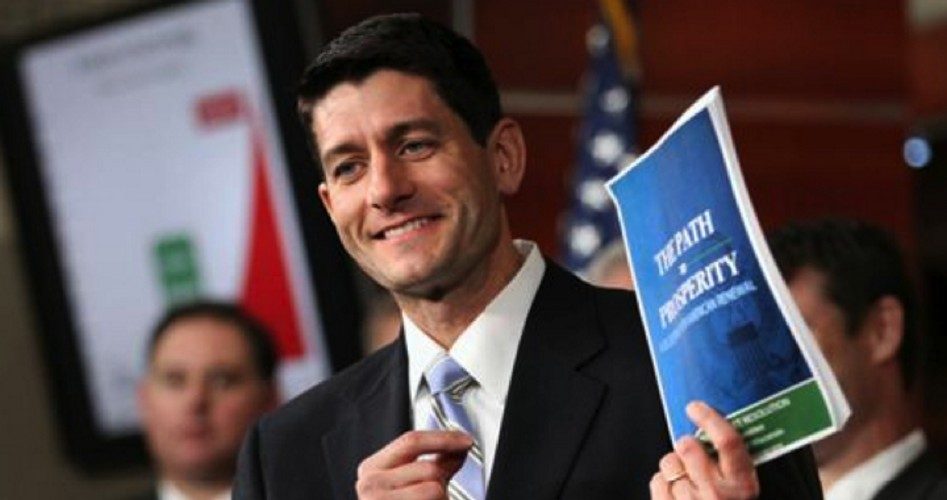
On Tuesday Rep. Paul Ryan (R-Wis.), chairman of the House Budget Committee, will roll out his new plan to balance the budget but, unlike last year’s plan, his new one will likely promise to balance the budget in 10 years instead of in 25. One key assumption to make it work is to repeal ObamaCare. Ryan told Fox News: “Our budget does promote repealing ObamaCare and replacing it with a better system. I’m very confident this is the way to go.”
That’s a very large assumption that Chris Wallace of Fox News challenged on Sunday:
Wallace: Are you saying, as part of your budget you assume the repeal of ObamaCare?
Ryan: Yes.
Wallace: Well, that’s not going to happen.
Ryan then responded that it really wasn’t an assumption after all, just a suggestion as to where he’d like to go:
We believe ObamaCare is a program that will not work. We believe ObamaCare will actually lead to hospitals and doctors and health care providers turning people away.
We don’t think healthcare’s going to be improved in this country. We think it’s going to look very ugly over the next couple of years.
That’s why we’re going to propose replacing ObamaCare with patient-centered health care — with a better healthcare system for everybody.
Nevertheless, by including the assumptions that ObamaCare and its related costs will disappear — along with increased revenues generated by an allegedly improving economy, the increased taxes coming in from the “fiscal cliff” deal, and the winding down of the U.S. military presence in Afghanistan and Iraq — Ryan thinks the shrinkage of the gap between the government’s income and outgo will be sufficient to balance the budget by 2022.
The one thing that will be missing from Ryan’s plan is increased taxes. Said Ryan, “We already had a tax increase. We think it’s unfair to ask hardworking taxpayers to pay more so Washington can spend more.”
Ryan’s new plan is likely to leave Social Security in place but will concentrate instead on replacing Medicare with block grants to the states coupled with vouchers. Ryan took umbrage at the term “vouchers” and tried to explain:
First of all, it’s not a voucher. It’s premium support. Those are very different. A voucher is you go to your mailbox, you get a check, and you buy something. That’s not what we’re saying.
We are saying, let’s convert Medicare into a system that works like the one I have as a congressman. [We] have a list of guaranteed coverage options, including traditional Medicare [if we want it].… Medicare subsidizes [the] plan based on who you are [with a] total subsidy for the poor and the sick [and] less of a subsidy for wealthy seniors.
It’s a distinction without a difference, and it’s not going to matter anyway. Doug Mataconis, writing in outsidethebeltway.com, says Ryan’s proposal will be Republican dreaming:
During the 112th Congress the House GOP voted some 33 times to repeal the PPACA [ObamaCare] in whole or in part. None of these bills went anywhere, and indeed most of them were never voted upon by the Senate. Had the Senate taken up the bills, of course, it would have rejected them on a strict party line vote. Had the Senate somehow managed to pass one of these bills, President Obama would have vetoed it and there would not have been sufficient votes in either the House or the Senate to override the veto.
And that was the last Congress. Republicans are even weaker in this year’s:
In the 113th Congress, Republicans have two fewer Senate seats and about ten fewer House seats. And Barack Obama is still the president. The prospect of the law being repealed is simply non-existent.
Ryan’s new proposal isn’t likely to generate much more support than did his previous attempt. In April 2011, a New York Times/CBS poll found that 61 percent of Americans thought Medicare was “worth the cost,” while a poll by the Kaiser Family Foundation taken the same month showed that most Americans “wanted to keep Medicare the way it is.” In a CNN/ORC poll taken in June, 2011, 58 percent of Americans opposed changing Medicare into a voucher system, while 74 percent of seniors opposed it.
Aside from these dubious assumptions, one may also question just how much savings will be generated as the military winds down its presence in Afghanistan and Iraq, or just how strong the U.S. economy will be in the years ahead, or just how willing Congress might be to collapse all 80 of the present federal welfare programs into one and let the states operate it, as Ryan is likely to propose. Of course, since all funding bills must originate in the House of Representatives (where Republicans have a majority), Republicans could accomplish, given sufficient understanding of their constitutional authority and sufficient support from an informed electorate, all that Ryan is seeking. They merely have to refuse to fund ObamaCare.
Until that happy day, nothing in Washington will change.
Even if Ryan’s proposal gets traction, passes the House and Senate, and is signed into law, it still wouldn’t slow down the growth of government. It would merely close the gap, ever so slowly, between revenues and expenses.
As Mataconis notes, “These assumptions have to have some basis in reality or the budget plan itself will end up being a joke … Ryan is assuming something that simply isn’t going to happen, which pretty much makes his entire budget not worth the paper it [will be] written on.”
A graduate of Cornell University and a former investment advisor, Bob is a regular contributor to The New American and blogs frequently at www.LightFromTheRight.com, primarily on economics and politics. He can be reached at [email protected].



